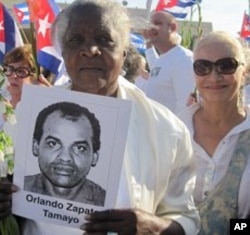Tens of thousands of people have marched in Miami to protest a recent crackdown in Cuba against dissident groups on the island. Cuban-Americans say there is a rising tide of resentment against the Cuban regime and the failure of promised reforms.
People dressed all in white filled the streets of the Miami neighborhood known as Little Havana for the march late Thursday. Many carried Cuban flags and chanted messages calling for freedom in Cuba.
Cuban-American singer Gloria Estefan helped organize the event and led marchers in the singing of the national anthems of Cuba and the United States. Near the close of the march, Estefan said they had received word that a dissident group was also marching in Havana. "At this moment they are receiving violence again. They are joined with us here," she said.
News reports from Havana said Thursday that Cuban police dragged away several protesters from the opposition group known as ladies in white (Las Damas de Blanco). The group includes many spouses and other relatives of dissidents jailed in Cuba. They have held several marches this week to demand the release of loved ones and mark the seventh anniversary of a major crackdown called "black spring."
Supporters of pro-democracy groups say other recent protests have taken place in Havana and in the countryside, suggesting that frustration at the government is on the rise.
University of Miami professor Andy Gomez says it is partly due to President Raul Castro's failure to deliver on his promises to improve the quality of life for many Cubans.
"The level of frustration has continued to increase and yet at the same time, they are going through the worst economic crisis since the special period when they lost their subsidies from the Soviet Union," he said.
Pro-democracy groups also have received a new boost from Afro-Cuban leaders, who traditionally were seen as a strong supporter of Communist policies. That image was shaken last month when black dissident Orlando Zapata Tamayo died, after an 85-day hunger strike in prison.
"Here we have a working class black man from eastern Cuba who was peacefully advocating change," said Orlando Gutierrez, who leads the Miami-based Cuban Democratic Directorate. "They imprison him and then, when he goes on a hunger strike, they deny him water for 18 days. They kill him, and people know that."
U.S. President Barack Obama said Zapata Tamayo's death and the harassment of protesters was deeply disturbing, and he called for the release of political prisoners.
In Cuba, President Castro expressed regret for the death, but the incident sparked another wave of marches to protest the conditions of jailed dissidents.
Gutierrez says if marches continue in Cuba, the movement is likely to generate even more supporters.
"Cuba's pro-democacy movement, the ladies in white, they're going into the streets, they are talking to people, they are carrying out protests throughout Cuba. People are seeing these guys are the option, they are the alternative," he said.
University of Miami's Andy Gomez says that frustration is also on the rise among Cuba's large youth population, especially university students concerned about their future in Cuba. But he says Cuba's government has a history of quelling dissent before too long.
"The question I ask myself is up to what point is the government going to allow this to continue, because it can get out of hand very quickly," he said.
Pro-democracy advocates say the United States could consider new measures as well, in an effort to push the Communist nation toward greater respect for human rights.








